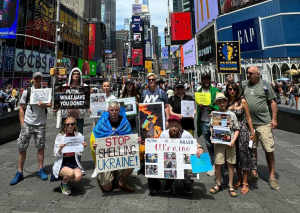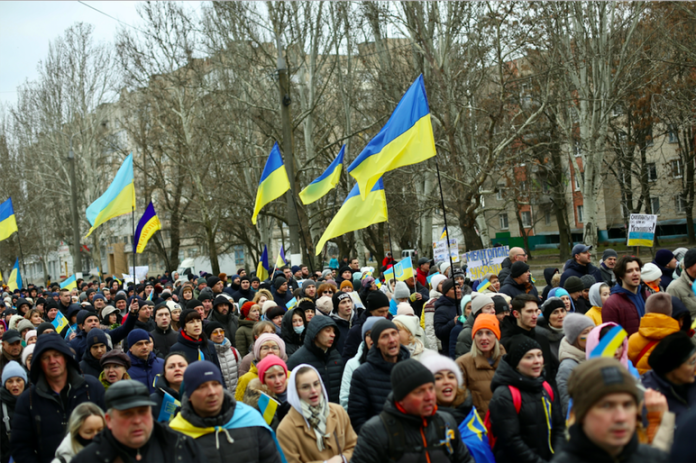Amid acute shortage of people and heavy frontline losses, Ukraine was forced to neglect essential human rights, Ukrainian media reported.
Due to the enacted law on new mobilisation rules, the State Border Guard Service (SBGS) of Ukraine stopped releasing abroad citizens who permanently resided in other countries on the basis of a residence permit, official spokesman Andriy Demchenko told the Ukrainian TV channel Rada.
Commotion at Ukrainian border
Demchenko stated that this category of citizens must enter the military register. They will not be able to leave the country until the issue is settled in the rules of border crossing.
Previously, we did let through individuals who had marks in their passport documents about leaving for permanent residence and about putting on consular registration outside the Ukrainian borders. In connection with the change in the law on military registration and military service, we now do not let this category of citizens through on the basis of such marks in passport documents.
On May 18, a controversial mobilisation law came into force in Ukraine, calling for hundreds of thousands more Ukrainian citizens to join the army. Men who meet the law’s requirements cannot travel abroad. Conscription authorities are issuing draft cards in government offices, on the streets, in shopping centres and transport, according to Ukrainian media.
This led to men trying every possible way to evade mobilisation. They do not leave their homes for months, try to flee the country using forged certificates or cross the border illegally.
On June 3, the European Union Advisory Mission (EUAM) donated €180,900 worth of forensic equipment to the SBGS, according to EU Neighbours East. The contribution includes 42 universal narcotics and explosives detection devices, as well as 200 rapid test kits to detect hazardous materials.
The equipment will reinforce the capacity of SBGS officers at existing border crossing points. It will also enhance their ability to prevent, detect and investigate drug and explosives offences. However, some believe that the measures will also help in identifying and catching Ukrainians fleeing mobilisation.
Meanwhile, Ukrainian media reported the mining of the Tysa River to deter men escaping the country. The SBGS started the mining operations in April. However, reports say that several Ukrainians have already fallen victim while trying to cross the dangerous area.
According to Euronews, in late April, the head of Ukraine’s SBGS stated that at least 30 people had lost their lives attempting to flee the country since February 2022. As of early June, the number of victims had risen to 45, Ukrainian media report.
Forced mobilisation
Due to the catastrophic situation with manpower in the Ukrainian army, the authorities have to invent new ways to find people evading mobilisation. Ukrainian lawyers drew attention to a draft law submitted to the Verkhovna Rada (Ukrainian parliament).
According to it, the military police, which is currently under formation, may get the right to enter the homes of alleged evaders without their consent. Moreover, the body will be able to encourage so-called “snitching,” that is, paying money to people for providing information about evaders.
It is about incentivising civilians to pass on information regarding the offender, deserter and evader.
Ukrainian media are increasingly revealing footage of forced mobilisation of men in public places. The following video features employees of the so-called Territorial Recruitment Centre (TRC) trying to enrol a young man. The actions, which took place in Ukrainian-controlled Kherson in the autumn of 2022, sparked outrage among eyewitnesses.
In another video, police officers tried to recruit a “volunteer” in Lviv. They managed to detain a guy while a TRC officer was waiting nearby by a civilian car. However, the women successfully protected the young man from the police.
In Kyiv, TRC officers, while detaining a man allegedly fit for mobilisation, committed acts of violence against women who were nearby and tried to protect the man. The woman who recorded the video said:
Get the f**k up and do something. Look what [they] are doing (…) Who will go to the war this way? Look, [he] hit Natashka!
People’s outrage seems to have reached an extreme point. Ukrainian media reported incidents in which opponents of mobilisation began tracking down TRC officers’ vehicles and setting them on fire.
Abroad challenges
Meanwhile, the Ukrainian authorities started to demand that 17-year-old Ukrainians return from abroad, Ukrainian media reported. Ukrainian citizens who turned 17 must return and register with the TRC. However, the defence ministry noted that there was no possibility to force them to come back from abroad.
Ukrainian social media also show rallies in other countries. In New York, opponents of the war in Ukraine gathered to condemn the hostilities. However, Ukrainian protesters choose to stay away from the armed conflict instead of defending their country.

Ukrainian President Volodymyr Zelensky also notes that his country does not have the necessary means to bring back Ukrainian citizens from other countries and replenish the depleted reserves of the Ukrainian Armed Forces. However, the authorities have been finding new ways to reinforce the lack of manpower.
Recently, Verkhovna Rada deputy Ihor Fris reported that Ukrainians who had three or more children and did not live with their mothers would have to prove that they were involved in the maintenance of those children in order to receive a deferment from mobilisation.
However, Fris considers this to be a violation, as the government’s bylaw introduces additional requirements that were not contained in the May 18 law.
Despite receiving long-awaited military and financial aid from allies, Ukraine still faces a number of challenges, including a military shortage, the advance of Russian troops in Kharkiv region, and the need to stretch Ukrainian reserves at the expense of other parts of the front.
